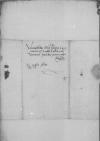List #4834
Ioannes DANTISCUS do Ermland (Warmia) ChapterHeilsberg (Lidzbark Warmiński), 1542-04-21
Regest polski:
Biskup napomina kapitułę, aby nie tolerowała przebywania na terenie swojej domeny konkubiny dopiero co rozgrzeszonego odstępcy [Alexandra Scultetiego]. Jeżeli Sculteti nadal będzie trwał przy swoich błędach, Dantyszek ukarze go zgodnie z prawem kanonicznym.
Rękopiśmienne podstawy źródłowe:
| ||||||
Tekst + aparat krytyczny + komentarzZwykły tekstTekst + komentarzTekst + aparat krytyczny
 GStA PK, HBA, C 1a, K. 497, p. 1unnumbered
GStA PK, HBA, C 1a, K. 497, p. 1unnumbered
Venerabilibus Dominis
Venerabiles Domini, fratres sincere dilecti.
cf. Cic. Off. 1.81 Quamquam hoc animi, illud etiam ingenii magni est, praecipere cogitatione futura et aliquanto ante constituere, quid accidere possit in utramque partem et quid agendum sit, cum quid evenerit, nec committere, ut aliquando dicendum sit “non putaram”.; V. Max. 7.2.2 Scipio vero Africanus turpe esse aiebat in re militari dicere “non putaram”, videlicet quia explorato et excusso consilio quae ferro aguntur administrari oportere arbitrabatur. Summa ratione: inemendabilis est enim error, qui violentiae Martis committitur.; Sen. Dial. 4.31.4 Turpissimam aiebat Fabius imperatori excusationem esse “non putaui”, ego turpissimam homini puto. Omnia puta, exspecta ⌊Non esse sapientis fertur non putaramcf. Cic. Off. 1.81 Quamquam hoc animi, illud etiam ingenii magni est, praecipere cogitatione futura et aliquanto ante constituere, quid accidere possit in utramque partem et quid agendum sit, cum quid evenerit, nec committere, ut aliquando dicendum sit “non putaram”.; V. Max. 7.2.2 Scipio vero Africanus turpe esse aiebat in re militari dicere “non putaram”, videlicet quia explorato et excusso consilio quae ferro aguntur administrari oportere arbitrabatur. Summa ratione: inemendabilis est enim error, qui violentiae Martis committitur.; Sen. Dial. 4.31.4 Turpissimam aiebat Fabius imperatori excusationem esse “non putaui”, ego turpissimam homini puto. Omnia puta, exspecta ⌋. Hoc quidem ob nuper reconciliatum
Proinde Fraternitates Vestras religiose pieque hortamur, ne eam
Fraternitates Vestras feliciter valere optamus.

